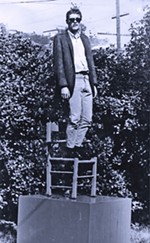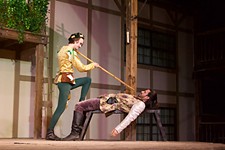Exhibitionism
Itzhak Perlman: Extension of His Soul
Fri., Feb. 12, 1999
February 7
While some of you were out spending hundreds of dollars at the Erwin Center on the obese Italian guy who can't quite hit his high notes like he used to, those of us whose classical music sensibilities run toward the exquisite and the refined took in one of Earth's greatest violinists at the UT Performing Arts Center.
Okay, Luciano Pavarotti put on a great show, too, by all accounts, but in Itzhak Perlman the world of classical music has a violinist so pure of touch that his instrument seems a deft extension of his impish body. His quiet and unassuming presence on stage belies his extraordinary expressiveness on that most plaintive and passionate instrument, the violin. On Sunday night, while the mob roared for Pavarotti, the thousands at the sold-out Bass Concert Hall won encore after encore from this exceptional musical craftsman. Rohan de Silva, accompanying Perlman on the piano, proved a sensitive and worthy cohort for an evening replete with dynamic interplay and several subtle asides.
Perlman's program was a progression of style and era -- a journey forward through history from the late Baroque period through the early 20th century. His opening selection was a piece from the early 18th century: John-Marie Leclair'sSonata in D Major for Violin and Piano, which begins with such a stately air it seems almost cumbersome in its nobility. But by the final movement, an allegro vivace with the jaunty title "Tambourin," Perlman began to flourish the exuberant and playful aspects of this quite accessible piece. Next came Beethoven's Sonata No. 9 in A Major for Violin and Piano, Op. 47, "Kreutzer," a three-movement work that summed up the power, fluidity, form, and elegance of the classical period's brightest -- and darkest -- star.
After the intermission, Perlman's selections moved into the early part of this century: Ravel'sSonata for Violin and Piano (1923 - 27), a sometimes awkward piece of music that included a "Blues: Moderato" middle movement with hints of slide guitar and frequent string plucking that laid the foundation for the glorious final selections of Heifitz transcriptions of Gershwin's "My Man's Gone Now," and "It Ain't Necessarily So" -- both from Gershwin's immortal folk-opera Porgy and Bess.
Throughout the evening, both the music and Perlman's playing style moved toward ever greater emotional interpretation and modernity: His bow strokes always fluid, yet incorporating a jarring, saw-like mania during the Presto sections of the Beethoven, and an industrial rapidity for the aptly titled "Perpetuum mobile: Allegro" of Ravel's closing movement. His violin is a subtle, extra helping of this wonderful man's soul, with which he effortlessly charmed the rapt audience. A heaping portion of encores rounded out the night, including the Theme from Schindler's List, a lightning quick Presto, and Tchaikovsky's Chanson sans Paroles for which Perlman had a quiet joke to share with the delighted crowd. Concluding with a wild, virtuoso Caprice, Perlman was required to take several bows, and one hopes that Austin audiences receive several more in the future from the quiet master with the effervescent violin.
-- Robi Polgar
LUCIANO PAVAROTTI: DREAMS AND ROSES
Frank Erwin Center
February 7
|
|
Lucianno Pavarotti has given dreams to millions of listeners all over the world in his long and illustrious career. Sunday night, the famous tenor made a few thousand more dreams come true to a sold-out audience at the Erwin Center for his only Austin appearance.
Pavarotti, who has been singing since 1961 when he won the "Concorso Internazional" in his home country of Italy, looked relaxed and considerably slimmed down in his dark brown tuxedo and white vest, ready to enjoy the evening. Even though he didn't hit the high Cs, his singing was mellow and full-bodied, with a warmth that reached out to eveyone in the audience. Strutting onto the stage with his signature handkerchief, Pavarotti began the evening with Addio, fiorito asil from Madame Butterfly, to the immediate joy of the audience. Upon seeing Pavarotti perform, I understood why ancient Mayan codices depict poets and singers with flowers coming out of their mouths -- Pavarotti was tossing roses from his all evening long.
Pavarotti and soprano Cynthia Lawrence took turns at center stage and together the two took Austin on a whirlwind tour of the world of opera, singing selected arias from several of the more famous ones. Lawrence also began the evening with one of the most popular arias from Madame Butterfly, Un bel di. She reached deep within to bring every ounce of emotion into her singing in order to give the piece the depth it needs; it was an exquisite rendition, like golden honey pouring from her mouth. As her Butterfly dreamed of her future, I was taken back to my past: my childhood and the first time I saw opera, in San Antonio at Municipal Auditorium. She reminded me of the dreams I had then -- the magic of the gift.
After each of his songs, Pavarotti kept thanking the audience, saying, 'Graci, graci, thank you very much' over and over, and he thoroughly enjoyed teasing them during his encore of five selections. Knowing what they wanted, he made them wait just a moment as he held up the orchestra, smiling slightly before going into La donna é mobile to the wild applause of everyone. And of course, he couldn't leave Austin without doing O sole mio. "I'm very happy," said Pavarotti. "You're very happy," and smiling, turning to the orchestra, "We're all very happy. I think we need to end this with a duet." And he and Lawrence did, with Brindisi from La Traviata. Ah, yes! Dreams, roses. Si, si, Pavarotti, we were mui allegri, allegri, allegri.. -- Mary Jane Garza
AIN'T MISBEHAVIN': THE POWER OF THE SPIRIT
Zachary Scott Theatre Center Kleberg Stage
Through March 14
Running time: 2 hrs
In Ain't Misbehavin', the power of the spirit compels you to move. There's no getting around it, there's no sidestepping it -- your feet will tap, your head will bob, and even the whitest of Zach's patrons will get their groove on. Partly because in Ain't Misbehavin' there is no story to speak of -- just the joyous dancin', the hungry flirtations, and the hootin' and hollerin' of the jook joints. It's all so much fun you might even mistake Jason Connor, the man pumping out all that sound behind the piano, for Fats himself (even though Connor is far leaner, not to mention whiter, than stout ol' Fats ever was).
Ain't Misbehavin' is probably best remembered as the vehicle that launched Nell Carter's career and won the 1978 Tony for Best Musical, but this local production staged by Zach artistic director Dave Steakley boasts vocal talent just as sassy and strong. They're here to take you back to Harlem, to the Twenties and Thirties, when lovable characters like Fats, along with jazz greats Duke Ellington and Cab Calloway, scorched clubs and music halls alike with their stride piano, rolling together the syncopated rhythms of ragtime and jazz into one rollicking sound. With their bowler hats askew and their double-breasted suits sagging just right, Marcus Maurice and Timothy Curry make the perfect pair of gentlemen, a couple of cats with voices as smooth as their moves -- Maurice the sly, lithe young'un and Curry the studied, sugarmouthed grandpop. A trio of lovely ladies are there for the ride, too, all dolled up in Thirties finery -- dripping with minks and silk scarves courtesy of Leslie Bonnell's costume design. There's the flirtatious breathiness of Janis Stinson, wriggling against the piano while she coos "Squeeze Me," and the starry-eyed, apple-cheeked Felicia Dinwiddie, whose nimble hoofing and melodious voice garner the spotlight probably more than anyone else. There's also Jacqui Cross, of Dreamgirls fame, whose pipes could make an organ jealous. And together, they're having a blast with these songs, which allow for as much showboating as sublime harmony work.
And whether they're dancing, goofing, flirting, or wailin' the blues, their fun is infectious. Sometimes the sounds ooze out like black tar syrup, and the cast slathers the harmony on thick and delicious, as in "The Viper's Drag," an unabashed anthem for gettin' high. Sometimes the sounds are quicker, although equally precise, as in "Black and Blue," from the 1929 revue Hot Chocolate. Ain't Misbehavin' chugs along, with Steakley administering just the right doses of humor, pathos, and groove to make the evening feel whole. Curry's delivery of "Your Feet's Too Big" is as hysterical as "This Joint Is Jumpin'" is boisterous; "Honeysuckle Rose" is as passionate as "Keepin' Out of Mischief Now" is blue. Again and again, these pieces move you -- whether to slap your knee, tap the arm of your chair, or wipe tears from your eyes. With big band fever probably about to swing its way out of popularity, this is a perfect time to move on over to Riverside and let this quintet spread some rhythm into your life. -- Sarah Hepola









